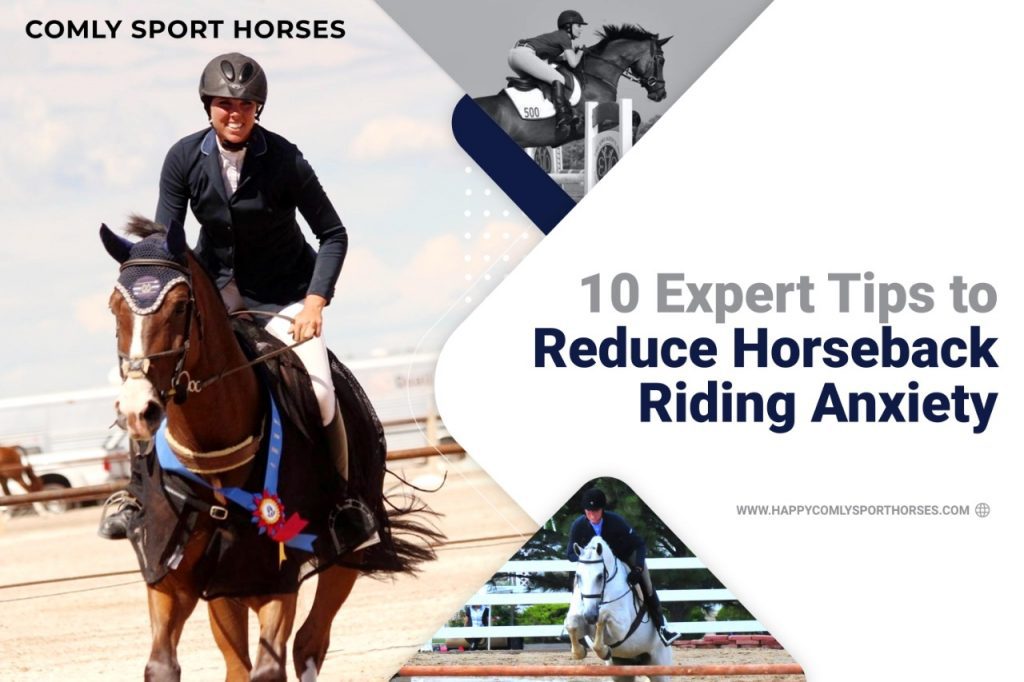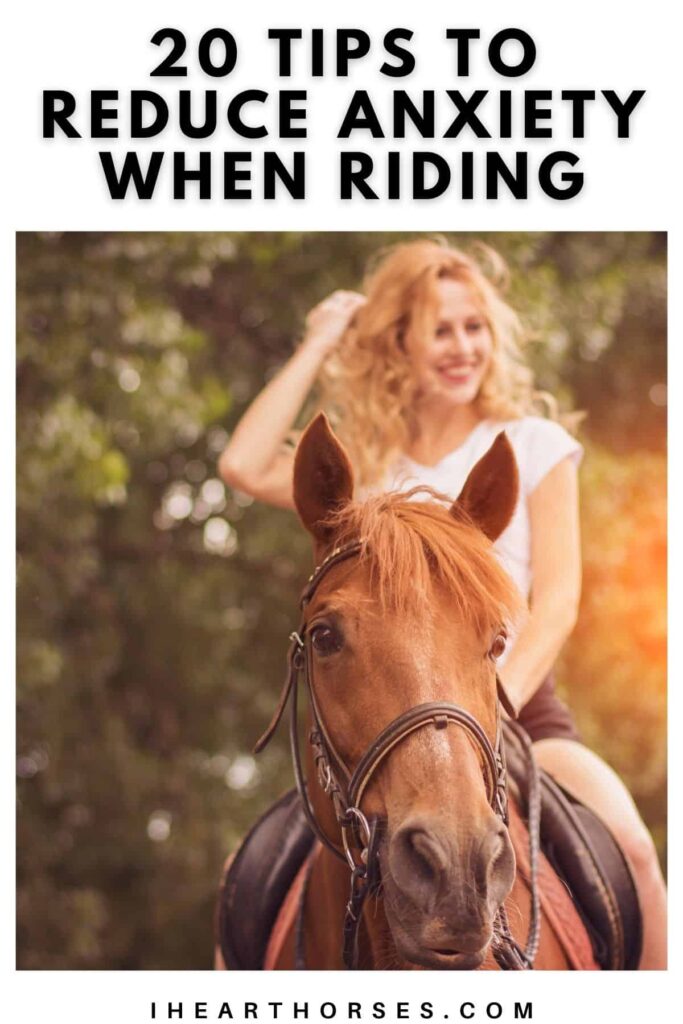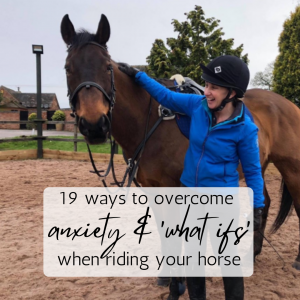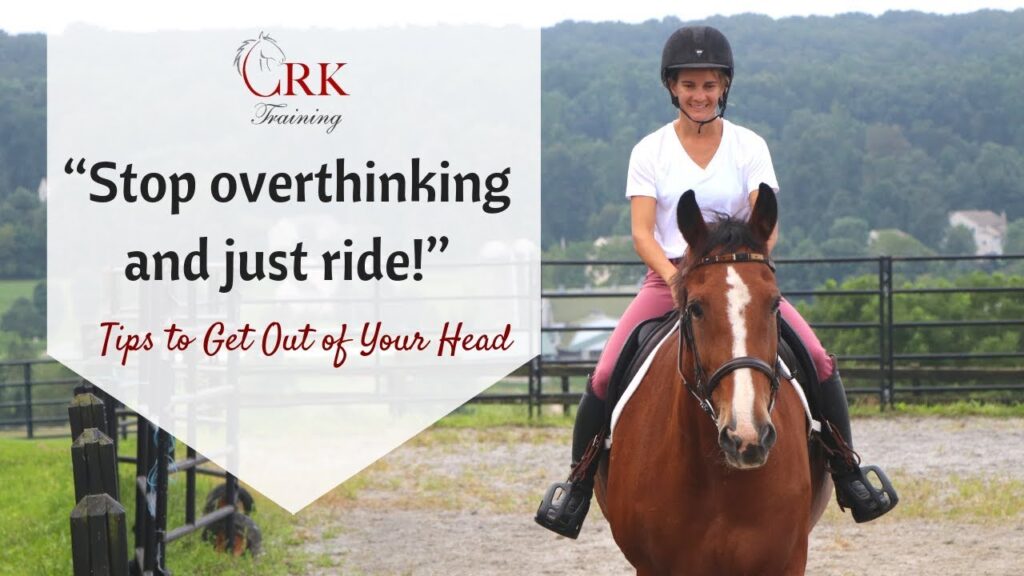Do you ever feel a little nervous when you hop onto the back of a horse? The anticipation, the uncertainty, it can all be a bit overwhelming at times. But fear not, because in this article we’re going to dive into the world of riding anxiety and explore some helpful techniques to overcome it. So saddle up and get ready to conquer those fears, because by the end of this, you’ll be riding with confidence!
Riding anxiety is a common issue that many equestrians face, and it can range from slight nerves to full-blown panic attacks. But fear not, because there are plenty of strategies and tips that can help you overcome these fears. In this article, we’ll discuss the importance of proper preparation, developing trust with your horse, practicing relaxation techniques, and seeking professional guidance if needed. So if you’re ready to conquer your riding anxiety and take your skills to the next level, keep reading because we’ve got you covered.
How to Overcome Riding Anxiety in Horseback Riding
Riding anxiety is a common issue that many horseback riders experience. Whether you are a beginner or an experienced rider, feelings of anxiety can arise for a variety of reasons. However, it is important to remember that riding anxiety can be overcome with the right strategies and support. In this article, we will explore the causes and effects of riding anxiety, as well as effective techniques to help you build confidence, manage anxiety, and enjoy your horseback riding experience to the fullest.

Understanding Riding Anxiety
Riding anxiety can stem from various factors such as a lack of confidence, fear of falling or getting injured, previous negative experiences, or simply feeling overwhelmed by the size and power of the horse. It is essential to understand that riding anxiety is a normal response to these perceived threats and challenges. By understanding the root causes of your anxiety, you can begin the process of facing and overcoming them.
Causes of Riding Anxiety
There are several common causes of riding anxiety that riders may experience. These include:
-
Fear of falling or getting injured: Falling off a horse is a common fear among riders, especially beginners. The potential risk of injury can create anxiety and hinder one’s ability to fully relax and enjoy the ride.
-
Lack of confidence: A lack of confidence in one’s riding skills and abilities can contribute to riding anxiety. This can be due to a lack of experience, low self-esteem, or previous negative experiences.
-
Overwhelm: The sheer size and power of horses can be overwhelming for some riders. Being in control of such a powerful animal can induce feelings of anxiety and stress.
-
Previous negative experiences: Traumatic or negative experiences such as a fall, a collision, or a spooked horse can leave a lasting impact on a rider’s confidence and increase their anxiety levels.

Effects of Riding Anxiety
Riding anxiety can have various effects, both physically and mentally. These effects may include:
-
Tension and stiffness: Anxiety can cause a rider’s body to become tense and stiff, inhibiting their ability to ride with ease and grace.
-
Decreased focus and concentration: Anxiety can distract riders and make it difficult for them to concentrate on their technique and cues, leading to potential mistakes or accidents.
-
Reduced enjoyment: Riding anxiety can prevent riders from fully immersing themselves in the experience of horseback riding, resulting in reduced enjoyment and fulfillment.
-
Avoidance of riding activities: Severe riding anxiety may cause individuals to avoid riding altogether, limiting their opportunities for growth and development as riders.
Recognizing Riding Anxiety
Recognizing and acknowledging your own riding anxiety is a crucial step towards overcoming it. Some common signs and symptoms of riding anxiety include:
- Increased heart rate or palpitations
- Racing or intrusive thoughts
- Sweating or trembling
- Feeling overwhelmed or panicky
- Muscle tension or stiffness
- Difficulty catching your breath
If you experience any of these symptoms before or during horseback riding sessions, it is important to address them and seek appropriate strategies for managing your anxiety. Remember, you are not alone, and there are effective ways to overcome riding anxiety.

Building Confidence
Building confidence is an integral part of overcoming riding anxiety. By setting goals, improving your riding skills, and working with a riding instructor, you can gradually boost your confidence and feel more in control while on horseback.
Setting Goals and Objectives
Setting clear and achievable goals can help you focus your energy and motivation towards overcoming your riding anxiety. Start by setting small, realistic goals that you can work towards. These goals may include riding for a specific amount of time, mastering a particular riding technique, or participating in a local riding competition. Celebrate your achievements along the way, no matter how small they may seem, as this will help build your confidence and keep you motivated.
Improving Riding Skills
Improving your riding skills is a surefire way to gain confidence in the saddle. Focus on areas that you feel uncertain or uncomfortable with and dedicate time to practice and refine those skills. Work on maintaining balance, developing a secure seat, and mastering basic riding techniques. Taking lessons from a qualified riding instructor can also help you identify areas for improvement and provide you with valuable guidance and feedback.
Working with a Riding Instructor
Working with a riding instructor who specializes in overcoming riding anxiety can be immensely beneficial. A professional instructor will not only provide you with technical guidance but also offer emotional support and help you develop effective coping strategies. They will create a safe and nurturing learning environment where you can gradually face and conquer your fears. A qualified instructor can also help you select the appropriate horse for your skill level and anxiety level, ensuring a positive and confidence-building experience.
Physical Relaxation Techniques
Engaging in physical relaxation techniques can help calm your body and mind, allowing you to better manage riding anxiety. Consider incorporating deep breathing exercises, progressive muscle relaxation, and visualization techniques into your routine.
Deep Breathing Exercises
Deep breathing exercises are simple yet powerful techniques for reducing anxiety and stress. Practice taking slow, deep breaths in through your nose, allowing your abdomen to expand fully, and then exhaling slowly through your mouth. Focus on slowing down your breath and releasing any tension or anxiety with each exhale. Deep breathing can help regulate your heart rate, promote relaxation, and bring a sense of calmness.
Progressive Muscle Relaxation
Progressive muscle relaxation involves tensing and then relaxing different muscle groups in your body to release tension and promote relaxation. Start by tensing a specific muscle group, such as your shoulders, for a few seconds, and then release the tension while focusing on the feeling of relaxation in that area. Move through each major muscle group in your body, progressively working your way from head to toe. This technique can help relieve physical tension and promote a sense of overall relaxation.
Visualization Techniques
Visualization techniques involve mentally rehearsing successful and positive riding experiences. Close your eyes and vividly imagine yourself riding confidently, feeling relaxed and in control. Picture yourself executing various riding skills with ease and grace. Imagine the sounds, smells, and sensations of the horse and the environment. By repeatedly visualizing positive outcomes, you can train your mind to associate riding with success and build confidence in the process.

Mindfulness and Meditation
Practicing mindfulness and meditation can be highly beneficial for managing riding anxiety. By grounding yourself in the present moment and cultivating a non-judgmental awareness of your thoughts and emotions, you can better navigate and regulate your anxiety responses.
Practicing Mindfulness in Horseback Riding
Mindfulness involves bringing your attention to the present moment and fully immersing yourself in the sensations and experiences of horseback riding. Rather than getting lost in worries or self-doubt, practice redirecting your attention back to the present. Focus on the feeling of the horse beneath you, the rhythm of your breathing, the sound of hooves hitting the ground. Cultivate a sense of curiosity and openness towards each riding experience, allowing yourself to fully engage and enjoy the present moment.
Meditation Exercises for Anxiety
Meditation exercises can help calm your mind and body, reducing anxiety and promoting a state of relaxation. Find a quiet and comfortable space, close your eyes, and focus on your breath. Allow thoughts and emotions to come and go without judgment, gently returning your attention to your breath whenever you notice it drifting. Start by practicing for just a few minutes each day and gradually increase the duration as you become more comfortable with the practice. Incorporating meditation exercises into your routine can help train your mind to stay present and centered, even amidst riding anxiety.
Positive Self-Talk and Affirmations
Positive self-talk and affirmations are effective tools for reprogramming your subconscious mind and replacing negative thoughts with empowering beliefs. By consciously challenging and replacing anxious thoughts, you can rewire your brain to think more positively and build resilience against riding anxiety.
Replacing Negative Thoughts with Positive Affirmations
Negative self-talk often fuels riding anxiety and undermines your confidence. Replace negative thoughts such as “I’m going to fall off” or “I’m not good enough” with positive affirmations such as “I can do this” or “I am becoming a more skilled rider every day.” Repeat these affirmations to yourself regularly, especially before and during riding sessions, to shift your mindset and boost your confidence.
Creating Personalized Mantras
Personalized mantras can serve as powerful reminders of your strengths and abilities as a rider. Create a mantra that resonates with you and reflects your desired riding experience. It could be something like “I trust myself and my horse,” “I ride with confidence and joy,” or “I am calm and focused in the saddle.” Repeat your mantra silently or out loud whenever you start to feel anxious, allowing it to anchor your mind and empower you in challenging moments.

Exposure Therapy
Exposure therapy involves gradually exposing yourself to the situations or stimuli that trigger your anxiety, allowing you to gradually build tolerance and confidence. While it may feel daunting at first, exposure therapy can be an effective technique for overcoming riding anxiety.
Gradual Exposure to Fearful Situations
Start by identifying specific situations or scenarios that trigger your riding anxiety, such as cantering, jumping, or riding in a crowded arena. Begin with the least anxiety-provoking situation and gradually work your way up to more challenging scenarios. For example, if cantering makes you anxious, start by cantering in a small, controlled area and gradually increase the duration and difficulty. The key is to expose yourself to these situations at a pace that feels manageable, allowing yourself time to become more comfortable and confident.
Working with a Supportive Riding Group
Finding a supportive riding group or community can provide encouragement, understanding, and camaraderie throughout your journey of overcoming riding anxiety. Seek out riders who have faced similar challenges or join a riding club or association where you can share experiences and receive support. Surrounding yourself with individuals who understand your fears and challenges can make the process of exposure therapy feel less daunting and more empowering.
Cognitive-Behavioral Therapy (CBT)
Cognitive-Behavioral Therapy (CBT) is a psychological therapy approach that can be effective in managing and overcoming riding anxiety. CBT focuses on identifying and challenging negative or irrational thoughts while implementing behavioral strategies to promote positive change.
Identifying and Challenging Anxious Thoughts
CBT involves recognizing and challenging the thoughts and beliefs that contribute to riding anxiety. Start by identifying the specific thoughts or “cognitive distortions” that arise when you feel anxious, such as “I will never be a good rider” or “Horses are dangerous.” Once you have identified these thoughts, question their validity and challenge them with more realistic and constructive alternatives. For example, instead of thinking “Horses are dangerous,” you could reframe it as “Horses are well-trained and can be trusted when I am riding safely and correctly.”
Behavioral Strategies for Managing Anxiety
CBT also incorporates behavioral strategies to help manage anxiety. These strategies may include breathing exercises, relaxation techniques, gradual exposure to fearful situations (as mentioned earlier), and visualization exercises. By combining cognitive restructuring with behavioral techniques, CBT equips riders with the tools to effectively manage riding anxiety and develop more positive and empowering thoughts and behaviors.
Relaxation Activities outside of Riding
Engaging in relaxation activities outside of horseback riding can help reduce overall stress levels and promote a sense of calmness, which can positively impact your riding experience. Consider incorporating activities such as yoga, Tai Chi, or other relaxation techniques into your routine.
Yoga for Riders
Yoga combines gentle movements with deep breathing techniques and meditation, helping to relieve tension, improve flexibility, and promote relaxation. Practicing yoga can enhance body awareness, balance, and strength, all of which are beneficial for horseback riding. Look for yoga classes or online videos specifically designed for riders or explore sequences that focus on building core strength, flexibility, and balance.
Tai Chi and Other Relaxation Techniques
Tai Chi is a martial art focused on slow, deliberate movements and deep breathing. It can help improve coordination, balance, and relaxation. Other relaxation techniques such as Pilates, stretching, or low-impact exercises can also be beneficial for riders, enhancing physical conditioning and promoting mental well-being.
Supportive Community and Networks
Connecting with a supportive community of fellow riders can provide invaluable support and encouragement while overcoming riding anxiety. Consider joining riding clubs or associations and participating in local events and competitions. Online forums and support groups can also provide a platform for sharing experiences, seeking advice, and receiving virtual support from riders around the world.
Joining Riding Clubs or Associations
Riding clubs and associations offer a sense of belonging and a community of like-minded individuals who share a passion for horseback riding. These communities often organize events, clinics, and social gatherings, providing opportunities to connect with other riders, build friendships, and access valuable resources and support networks.
Online Forums and Support Groups
The internet offers a wealth of resources for riders seeking support and guidance. Joining online forums, Facebook groups, or dedicated riding anxiety support groups can connect you with riders who have experienced or overcome similar challenges. These platforms provide a safe and non-judgmental space to share your fears, ask questions, and receive encouragement and advice from riders who have been in your shoes.
Professional Help and Counseling
If riding anxiety persists or interferes significantly with your quality of life and enjoyment of horseback riding, it may be beneficial to seek professional help and counseling. Consulting with a therapist or psychologist who specializes in anxiety disorders or equestrian-related issues can provide you with the tools, techniques, and support necessary to overcome riding anxiety.
Consulting with a Therapist or Psychologist
A therapist or psychologist can help you explore the underlying causes of your riding anxiety and develop personalized coping strategies. They can guide you through various therapeutic approaches such as Cognitive-Behavioral Therapy (CBT), exposure therapy, or mindfulness-based interventions. Therapy sessions provide a safe and non-judgmental environment where you can openly discuss your fears, emotions, and experiences, and receive support and guidance towards overcoming riding anxiety.
Seeking Equestrian Coaching
In addition to therapy, seeking equestrian coaching or instruction from someone who specializes in anxiety-related issues can be incredibly beneficial. Equestrian coaches with experience in helping riders overcome anxiety can provide you with tailored guidance, support, and constructive feedback. They can help you build confidence, improve your riding technique, and develop effective strategies for managing anxiety while on horseback.
Care for the Horse
Understanding your horse’s behavior and needs is fundamental to building trust and a positive relationship, which can positively impact your riding experience. Taking good care of your horse will contribute to their well-being and build a foundation of trust, allowing you to feel more secure and confident while riding.
Understanding the Horse’s Behavior and Needs
Take the time to learn about horse behavior and communication. Understanding how horses think and react can help you anticipate their responses and effectively communicate with them. This knowledge can increase your confidence by allowing you to predict and respond appropriately to your horse’s behaviors, further strengthening your bond with your equine partner.
Establishing Trust and Bond with the Horse
Building a strong bond and trust with your horse is essential for both your safety and enjoyment. Spend time grooming, bonding, and interacting with your horse outside of riding sessions. Establishing a positive relationship based on trust and respect will enhance your confidence and make your riding experience more enjoyable. Developing a strong partnership with your horse will also create a sense of security and reduce anxiety on both sides.
Proper Safety Measures
Taking the necessary safety measures is essential to ensure a safe and enjoyable riding experience. Wearing appropriate riding gear, understanding riding regulations and guidelines, and prioritizing your safety are all crucial aspects of managing riding anxiety.
Wearing Appropriate Riding Gear
Always wear appropriate riding gear to protect yourself and minimize the risk of injury. This includes a well-fitting helmet, riding boots with a heel, and comfortable and durable clothing. Proper gear will instill a sense of safety and allow you to focus on your riding rather than worrying about potential accidents.
Understanding Riding Regulations and Guidelines
Familiarize yourself with riding regulations and guidelines specific to your region or discipline. Understand the rules regarding arena etiquette, riding in groups, and the use of safety equipment. Knowing and adhering to these guidelines will not only keep you safe but also contribute to a harmonious and enjoyable riding environment for all.
Regular Practice and Exposure
Consistent practice and exposure to horseback riding will gradually desensitize you to riding anxiety, build confidence, and improve your overall riding skills. By pushing through your fears and consistently challenging yourself, you will progressively overcome riding anxiety and develop into a more confident and competent rider.
Consistent Riding Sessions
Make riding a regular part of your routine. The more you ride, the more comfortable and confident you will become. Commit to a riding schedule that allows for consistent practice, ideally several times a week. Consistency is key to building muscle memory, refining your technique, and progressively conquering your riding anxiety.
Participating in Riding Competitions
Participating in riding competitions may seem daunting at first, but it can be a valuable experience for building confidence and measuring your progress as a rider. Start with local or smaller events that cater to riders of all levels, allowing you to gain exposure to the competition environment in a supportive and less pressurized setting. Celebrate your achievements, whether big or small, and use each competition as an opportunity to grow as a rider.
Conclusion
Overcoming riding anxiety is a journey that requires patience, self-compassion, and perseverance. By implementing the strategies outlined in this article, you can take significant steps towards managing and overcoming your riding anxiety. Remember, you are not alone in your journey. Seek support from qualified instructors, therapists, and fellow riders who can guide and encourage you along the way. With time, practice, and the right mindset, you can build the confidence and resilience necessary to fully enjoy the exhilarating experience of horseback riding. So saddle up, face your fears, and let the joy of riding become your ultimate companion on this incredible journey.